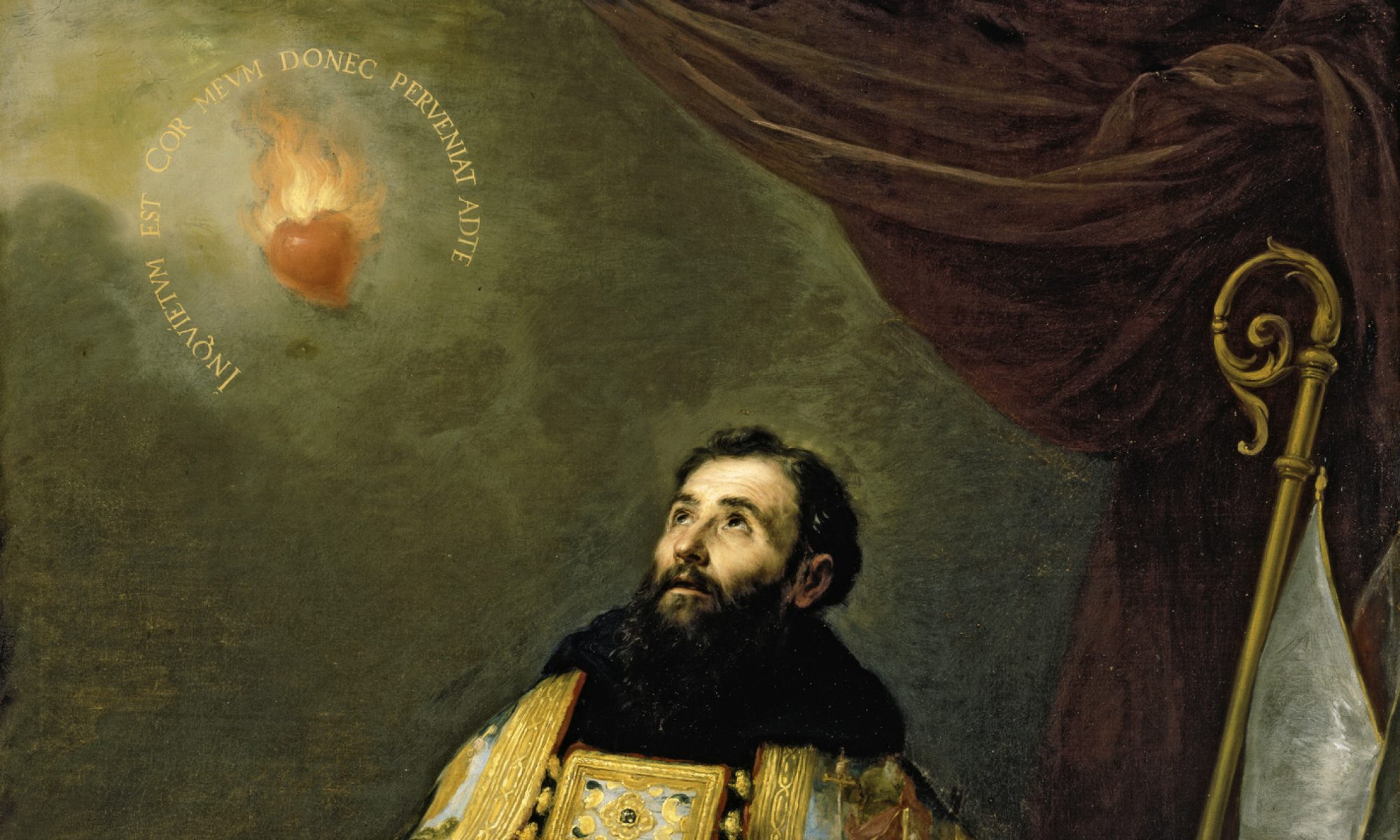Since I was a seminarian, I always encounter these words, humility and meekness, many times. In fact, I believe that Jesus has been inculcating to all His followers about being humble. He knows that laboring humbly for the Gospel brings a higher percentage of success. I have also heard the same pattern from our Father St. Augustine, an experiential teaching that after his conversion to God, he affirms that humility and meekness are important in our Christian life. By knowing the truth about God, who prepared all of us, we need His teaching that humility is primarily imparted to us thru Christ’s passion and death on the cross. This is the remedy of sin and cause of salvation and to think that it gives us happiness in life. Among all other virtues, it is a necessary virtue to understand and to capture the truth of God. The first part is humility, the second is humility and the third is humility, according to St. Augustine. He expounded clearly that Christ himself said in today’s reading from Matthew 11:28-29 that people should learn from Him because of His meekness and humility, and not focus on His numerous miracles. Our salvation is possible by Christ’s example of humility that gives us an opportunity to change. Our sinful pride is a disaster to Jesus’ plan of redemption. Furthermore, we cannot rely on ourselves like St. Augustine’s exposure to sinful living which caused him much pain; however, as soon as he surrenders himself to God, He leads him to the greatest comfort and joy. Sad to say, the world teaches counterculture for us to think that it is power and fame that make us great. No, that makes us more prone to unhappiness and depression. Hence, we are nothing without being humble before God.
Today is the 14th Sunday in Ordinary Time, and in the first reading from the book of Zechariah, the chosen people of Israel are consistently bowing to welcome a King who could save them. Thus, this passage is calling Israel to rejoice when the Lord says, “Rejoice heartily, O daughter Zion, shout for joy, O daughter Jerusalem! See, your king shall come to you.” Yes, indeed, the King came not as they expected with power, big adulation, and grandeur but as a King with simplicity and humility. He shall engage in peace to the nations and “banish the weapons and instruments of war.” This is the promise that the believers long for that remains within one’s heart. Are there any among us who don’t need that promise of God’s kindness and love?
The second reading, taken from the letter of St. Paul to the Romans, speaks to us that, “You are not in the flesh, on the contrary, you are in the spirit, if only the Spirit of God dwells in you.” Therefore, it is important that God has chosen us by molding everyone according to His Spirit in order to understand the spiritual truths of God. We are given our birthright by baptism as His children through Jesus Christ. Do we realize that we are much more than our flesh because the Spirit of God dwells within us? We are given this spiritual gift as our true existence. The Spirit dwells within us to gain victory in Jesus Christ for His words spoken. Indeed, it gives us victory in Christ the Lord.
Today’s gospel from St. Matthew offers an invitation from Jesus: “Come to me, all who labor and are heavily burdened, and I will give you rest.” These words are for everyone who wants to follow our Lord Jesus. I believe those who would be receptive to Jesus’ invitation are simple people, sick and those who found themselves in the periphery which gives them everlasting Hope. Let us reflect on this preaching of Jesus:
First, Jesus’ words, “Come to me,” means a loving invitation to be intimate with Him. It is obviously an offering of divine intervention.
Second, Jesus says, “Come to me, all who labored and are heavily burdened,” which is an assurance of healing and relief for those weary people, exhausted men carrying their unbearable sufferings and crosses in life, and also to remember that Jesus takes the burden for them on His shoulders, and cares for them.
Third, Jesus finally says, “and I will give you rest.” Maybe our lives are in the midst of burdens, anxieties, troubles, and indifferences in this imperfect world. Jesus knows that it is only through Him that we absolutely experience the fullness of being under His power to enjoy complete repose. However, we need to come to our interior life and find that presence of God because of St. Augustine’s thought, “In our restlessness, we find rest only in God.”
Our readiness to completely understand Jesus is through humility and acceptance of the “yoke.” The yoke of Jesus is not heavy, but rather easy for it comes from a very personal relationship He totally offered. It implies that if we learn from Him, we can effortlessly relate in oneness with Him. We walk side by side with Jesus, cooperating with Him knowing that He is there to guide and to love us with His merciful heart.
God bless you.
Fr. Arlon, osa
——————————
El Dictado del Corazón
Decimocuarto Domingo del Tiempo ordinario, año, A
- Zacarías 9:9-10
- Salmo 145:1-2, 8-9, 10-11, 13-14
- Romanos 8:9, 11-13
- Mateo 11:25-30
Desde que era seminarista, siempre me encontré con estas palabras; humildad y mansedumbre. Yo creo que Jesús ha inculca a todos sus seguidores a ser humildes. Sabe que trabajar humildemente por el Evangelio trae un mayor satisfacción y éxito. También lo he oído a nuestro Padre San Agustín, enseñanza que el experimento después de su conversión a Dios, afirma que la humildad y la mansedumbre son importantes en nuestra vida cristiana. Al conocer la verdad acerca de Dios, quien nos preparó a todos, necesitamos Su enseñanza de que la humildad se nos imparte principalmente a través de la pasión y muerte de Cristo en la cruz. Este es el remedio del pecado y causa de salvación y pensar que nos da felicidad en la vida. Entre todas las demás virtudes, es una virtud necesaria para comprender y captar la verdad de Dios. La primera parte es humildad, la segunda es humildad y la tercera es humildad, según San Agustín. Expuso claramente que Cristo mismo dijo en la lectura de hoy de Mateo 11:28-29 que la gente debe aprender de Él por Su mansedumbre y humildad, y no enfocarse en Sus numerosos milagros. Nuestra salvación es posible a través del ejemplo de humildad de Cristo que nos permite cambiar. Nuestro orgullo pecaminoso es un desastre para el plan de redención de Jesús. Además, no podemos confiar en nosotros mismos como la exposición de San Agustín a una vida pecaminosa que le causó mucho dolor; sin embargo, tan pronto como se entrega a Dios, Él lo conduce al mayor consuelo y alegría. Lamentablemente, el mundo nos enseña contracultura para que pensemos que es el poder y la fama lo que nos hace grandes. No, eso nos hace más propensos a la infelicidad y la depresión. Por lo tanto, no somos nada sin ser humildes ante Dios.
Hoy es el decimocuarto domingo del tiempo ordinario, y en la primera lectura del libro de Zacarías, el pueblo elegido de Israel se inclina constantemente para dar la bienvenida a un Rey que podría salvarlos. Por lo tanto, este pasaje llama a Israel a regocijarse cuando el Señor dice: “¡Alégrate de corazón, hija de Sion, da voces de júbilo, hija de Jerusalén! Mira, tu rey vendrá a ti. Sí, de hecho, el Rey no vino con el tipo de poder que esperaban con adulación y grandeza, sino como un Rey con sencillez y humildad. Se comprometerá en la paz con las naciones y “desterrará las armas y los instrumentos de guerra”. Es la promesa que anhelan los creyentes la que permanece en el corazón. ¿Hay alguno entre nosotros que no necesite esa promesa de la bondad y el amor de Dios?
La segunda lectura, tomada de la carta de San Pablo a los Romanos, nos habla de que “No estén en la carne, al contrario, estén en el espíritu, si el Espíritu de Dios habita en ustedes”. Por lo tanto, Dios debe elegirnos moldeando a todos según Su Espíritu para comprender las verdades espirituales de Dios. Se nos da nuestra primogenitura por el bautismo como Sus hijos a través de Jesucristo. ¿Nos damos cuenta de que somos mucho más que nuestra carne porque el Espíritu de Dios mora dentro de nosotros? Se nos da este don espiritual como nuestra verdadera existencia. El Espíritu mora dentro de nosotros para obtener la victoria en Jesucristo por Sus palabras habladas. De hecho, nos da la victoria en Cristo el Señor.
El evangelio de hoy de San Mateo ofrece una invitación de Jesús: “Venid a mí todos los que estáis trabajados y cargados, y yo os haré descansar”. Estas palabras son para todos los que quieren seguir a nuestro Señor Jesús. Creo que quienes serían receptivos a la invitación de Jesús son personas sencillas, enfermas y aquellas que se encuentran en la periferia que les da la Esperanza eterna. Reflexionemos sobre esta predicación de Jesús:
Primero, las palabras de Jesús, “Venid a mí”, significan una invitación amorosa a tener intimidad con Él. Es una ofrenda de intervención divina.
En segundo lugar, Jesús dice: “Venid a mí todos los que estáis trabajados y cargados”, lo cual es una garantía de curación y alivio para aquellas personas cansadas, hombres agotados que llevan sus insoportables sufrimientos y cruces en la vida, y también para recordar que Jesús lleva la carga por ellos sobre sus hombros, y se preocupa por ellos.
Tercero, Jesús finalmente dice: “Y yo os haré descansar”. Tal vez nuestras vidas están en medio de cargas, ansiedades, problemas e indiferencias en este mundo imperfecto. Jesús sabe que sólo a través de Él experimentamos la plenitud de estar bajo su poder para disfrutar del completo reposo. Sin embargo, necesitamos llegar a nuestra vida interior y encontrar la presencia de Dios debido al pensamiento de San Agustín: “En nuestra inquietud, encontramos descanso solo en Dios”.
Nuestra disposición a comprender completamente a Jesús es a través de la humildad y la aceptación del “yugo”. El yugo de Jesús no es pesado, sino fácil porque proviene de una relación muy personal que Él ofreció. Implica que si aprendemos de Él, podemos relacionarnos sin esfuerzo en unidad con Él. Caminamos al lado de Jesús, cooperando con Él sabiendo que Él está allí para guiar a un y amarnos con su corazón misericordioso.
Dios lo bendiga.
Padre Arlón, osa

